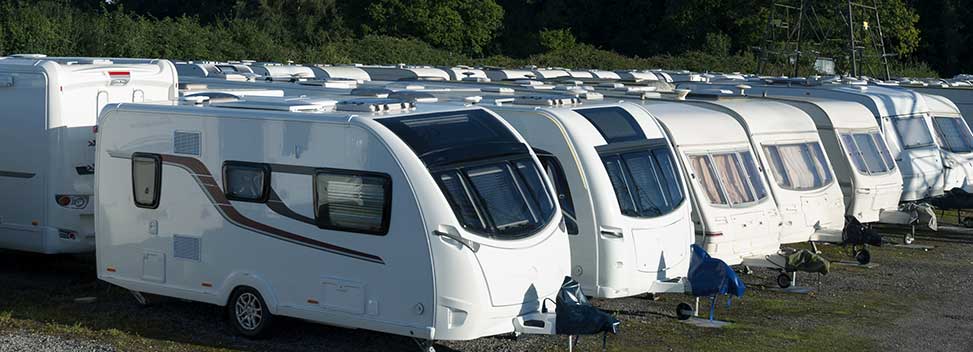Storing your caravan – What you need to know
Written by Nick Grant
|
Published on 17th October 2022
|
Last Updated on 23rd February 2024
|
Read time: 6 minutes

Unless you’re planning a year-round adventure, you might need somewhere to store your caravan when it’s out of use. If you’ve enough room, you could store it on your driveway. But if not, you’ll need to make alternative arrangements.
Thankfully, there are plenty of caravan storage sites throughout the UK to help keep your caravan safe. So, let’s run through average costs and what you need to know before waving goodbye to your caravan.
Storing your caravan
Although you might find plenty of people offering their land for a small fee, cheap storage with poor security may not be ideal for storing a caravan. From weather damage to theft, your caravan could be at-risk all year, especially when it’s left unattended during colder months. Therefore, finding a dedicated, secure storage site might help to maintain your caravan’s condition and keep it safe.
Caravan storage sites can offer a range of security features, including CCTV, locked gates, and security staff to minimise the risk of thieves. You’ll even find some caravan storage sites offering servicing, so you can pay to have your caravan cleaned or repaired while leaving it in their care.
Caravan storage options
You can choose from various storage options, including:
- Covered storage – Covered storage options are generally more expensive, but they come with added weather protection because you can store your caravan in a sheltered location, such as a barn or warehouse.
- Outdoor storage – You can store your caravan on a dedicated outdoor pitch site, which is typically gated. Usually, you can also choose from various surfaces, such as gravel or tarmac.
- Campsite storage – Some campsites let you leave your caravan for a set fee. Campsites usually have high levels of security, including CCTV and security personnel to keep an eye on your caravan.
- Home storage – If you have enough room, you can store your caravan on your property, such as on the driveway. However, this comes with added risks such as theft and frost, so you might want to invest in caravan insurance for added protection.
If you have a mobile home or static caravan, you’ll need to leave your caravan at the campsite until your next visit. Therefore, mobile home sites usually have added security, but leaving your home unattended may still have risks. Although it’s not a statutory requirement, static caravan insurance may provide cover against risks such as theft, malicious damage, and landslips.
How much does caravan storage cost?
The cost of caravan storage can vary depending on where and how you choose to store your caravan. Other factors like the size of your caravan and the duration of storage also affect prices. Here are a few factors to consider.
- Type of storage – Generally, indoor, covered options are pricier than outdoor storage areas. If you want to keep costs down, you might choose an outdoor pitch.
- Location – Prices can vary depending on where the pitch is in the UK. For instance, it may be more expensive down South than in Northern areas.
- Duration – As you’d expect, the longer you store your caravan, the more it will cost. In winter, prices can creep up considerably. However, you might get better value for money if you store your caravan for longer.
- Caravan size – If your caravan is large, it’ll take up more space on the site. Double-axel caravans are usually more expensive to store than single-axel.
- Security level – Caravan sites offering high levels of security are generally more expensive. For example, a pitch site with CCTV and externally monitored systems may cost more than a storage site with only lockable gates.
Costs vary throughout the country depending on the factors we’ve listed above.
What to consider before storing a caravan for winter
Choosing a storage site requires careful consideration. Here are some things you may want think about:
- Security – Look for sites offering high levels of security to protect your caravan against risks, especially theft and vandalism.
- Location – Consider where you want to store your caravan – you may choose somewhere closer to home, or nearby your typical holiday destination.
- Towing – Check if the storage provider offers towing services. Otherwise, you’ll need to tow the caravan yourself. If you do tow your caravan, consider purchasing touring caravan insurance for extra protection while driving.
- Bay size – Ensure the pitch site is big enough to store your caravan.
- Pricing – Alongside cost, make sure the pricing schedule fits your needs. Some sites offer monthly, weekly, or quarterly storage options, so you might not have to commit to a full year.
How to prepare your caravan for storage
Most caravan owners leave their caravans in storage during the winter months, ready to return in spring. But it’s not quite as simple as taking your caravan to storage, paying the fee, and heading home. First, you need to prepare your caravan to keep it safe during winter. Here are a few tips:
- Drain down the caravan to remove all water from the pipework, boiler, and water systems.
- Clean and empty your caravan to avoid any potential damage.
- Check for any holes, loose joints, or gaps and repair as needed.
- Remove anything that can’t be secured, especially if it’s valuable.
- Clean all gutters to remove any debris and water.
- Check the caravan seals are intact.
- Purchase a caravan cover to add further external protection from weather damage.
For added protection against risks such as theft, vandalism, and accidental damage, consider purchasing caravan insurance. At Intasure, we offer flexible policies designed to suit your needs. Our advisors are on-hand to help you find suitable cover, whether your caravan is sat in storage or you’re heading out on a coastal break. Call our team on 0345 111 0680 or get a quote online.
*The sole purpose of this article is to provide guidance on the issues covered. This article is not intended to give legal advice, and, accordingly, it should not be relied upon. It should not be regarded as a comprehensive statement of the law and/or market practice in this area. We make no claims as to the completeness or accuracy of the information contained herein or in the links which were live at the date of publication. You should not act upon (or should refrain from acting upon) information in this publication without first seeking specific legal and/or specialist advice. Arthur J. Gallagher Insurance Brokers Limited trading as Intasure accepts no liability for any inaccuracy, omission or mistake in this publication, nor will we be responsible for any loss which may be suffered as a result of any person relying on the information contained herein.
Ref: FP1455-2022
[/fusion_text][/fusion_builder_column][/fusion_builder_row][/fusion_builder_container]
Nick Grant is a Business Development Manager at Intasure with 10 years of insurance experience.

